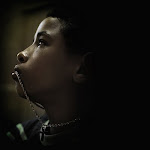 |
| Abdullahi and his little brother from Kenya |
How Abullahi does this - this ray of hope - is beautiful and painful to witness... This poignant short story says more than words ever could about the unique and powerful role that children and youth often do have in catalyzing change in their communities...even in the worst circumstances. Let's make a point to notice and celebrate children's contributions to envisioning and bringing about a better future wherever and however these occur. As for Abdulahi's community, raising awareness and support for schemes that support pastoralists to face existing and impending losses is another way to build resilience.
 |
| Kalacha, Marsabit district where a satellite imaging insurance scheme will be used Photograph: Gideon Mendel/© Gideon Mendel/Corbis Abdullahi's Story \ |






